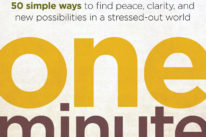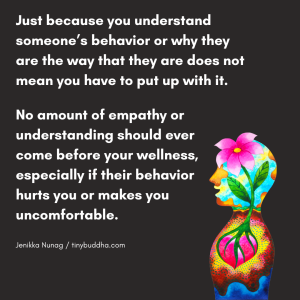
“I vow to let go of all worries and anxiety in order to be light and free.” ~Thich Nhat Han
My dad had been ill, in and out of the hospital for a couple of weeks, when my mother called with news that he had been airlifted from their local hospital to a larger regional medical center. My dad suffered from Crohn’s Disease for nearly fifty years at that point and was experiencing severe abdominal pain believed to be from a perforation of his bowel.
We would learn over the next few hours that even surgery to remove a malignant tumor was not guaranteed to save his life.
Throughout the long night, my mom and brother, along with my partner and I, shared a grim, poorly lit room reserved for families of emergency surgery patients.
Throughout the trauma of that first night and the days that followed, I made it my mission to normalize, plan, and cope. I called relatives and kept those closest to my dad up to date. I paid for hotel rooms for my mom and brother, neither of whom could afford to stay overnight near the hospital.
I became a caregiving overachiever, connecting personally with the nursing staff but careful to not be too pushy.
My visits coincided with physician rounds where I asked questions and kept detailed notes. Once back at work as a librarian, I used online medical databases to get all the journal articles I could find about my dad’s condition.
I built a fortress of information for reassurance. For the next eighteen months, I accompanied my parents to specialist appointments and tried in every way possible to make life normal. I paid their bills when they could not and funded the expensive health insurance my father now required due to his condition.
Desperate problem solving became normal, necessary, and my job. What I didn’t realize, though, was the permanent adjustment I was making to a “high alert” status.
In this fear-based mode of living, I was on constant lookout for any sign of danger so I could switch into containment mode, minimizing discomfort as fast as possible.
When my father‘s cancer recurred after a period of relatively good health, we were all devastated. He died nine months after the recurrence, withdrawn and sad, while receiving hospice care at home. I felt like I had failed to keep everyone safe.
As I grieved in the months and years that followed, I transferred the high alert skills to my job as a project manager, priding myself on my ability to see risks well ahead of others. I thought this protected me from uncertainty and, consequently, fear and anxiety.
In fact, it ratcheted my alert status up to an even higher level—one that ultimately proved unsustainable. After nearly a year of leading a highly visible and high stakes project, I found myself sitting on the couch one morning, paralyzed by a combination of fear, sadness, and rage.
I was unable to get ready for work. My big project had stalled, I was terrified of displeasing my boss, and I was angry that I couldn’t see my way clear of these problems. There was no bright line to the future.
I learned that these crisis moments offer opportunities to practice letting others help us and learn new ways of living. Here are 8 strategies that have helped me:
1. Find a neutral advocate.
Objective outside support is crucial during a crisis period. Friends and family can often recommend a life coach, therapist, or spiritual advisor with whom they have worked. If you are reluctant to talk with friends, you can use social networking tools like LinkedIn to see if someone in your network is connected to an individual who can help.
2. Practice mindfulness.
There’s value in focusing on our breath to quiet the turmoil in our minds. Look for a meditation or spiritual center that offers a basic class in meditation, mindfulness, or prayer. Even ten minutes each day in quiet reflection will improve your focus, resiliency, and peace of mind.
3. Replenish yourself.
You might be depleted from years of constant vigilance and striving. Commit to leave at the end of your workday, at least a few days a week, even if everything isn’t done. Reconnect with parts of yourself that you haven’t seen for a while by watching a favorite movie or surrounding yourself with your favorite color.
4. Try another perspective.
Most people are doing their best but are primarily caught up in the storyline of their own lives. Even thirty seconds of viewing a situation from another’s point of view can diffuse your negative inner dialogue about a person or situation.
5. Know your limits.
When you are feeling pressured or negative, check to see if you are tired, hungry, or otherwise not feeling well. Avoid pushing through these feelings and stop your activity. Return to your situation later when you are feeling more refreshed.
6. Make something.
Many of us lose touch with our creative self as work and family commitments take more of our energy. Working with our hands can effectively pull us out of a mental rut and create pride in our own abilities. Handcrafts like sewing, knitting, embroidery, as well as woodworking, cooking, pottery making, and home improvement projects are all satisfying ways to feel purposeful.
7. Look for like-minded folks.
Connect with new friends and old acquaintances that are calm, self-aware, and in touch with their own unique humanity. Finding others to share interests and a good laugh provides a balance to the more stressful aspects of life.
8. Reconnect with your love.
Create opportunities to deepen your conversations beyond the rushed and sometimes business-like communication of daily life. Increasing conversational intimacy will strengthen intimacy throughout your relationship.
After a long day, when you’re tired and have slipped back into old patterns and reactions, remember that these techniques are like muscles that get stronger each time you use them.
Photo by Sagisen
About Kelli Koob
Kelli Koob is a cook, writer, and artist practicing mindfulness and meditation. She makes a living as a change manager and project developer for local government. She lives with her partner and pets in Minneapolis. Follow her on Twitter @coco63.













 Though I run this site, it is not mine. It's ours. It's not about me. It's about us. Your stories and your wisdom are just as meaningful as mine.
Though I run this site, it is not mine. It's ours. It's not about me. It's about us. Your stories and your wisdom are just as meaningful as mine. 